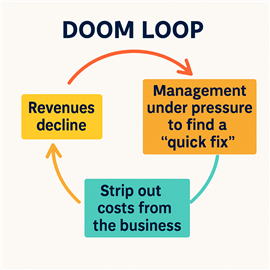Strong leadership, not quick fixes: why resilience—not cost-cutting—is the path to survival in turbulent times
06 August 2025
Amid market volatility, inflation, and rising costs, IRN columnist Andy Wright argues that organisational resilience is no longer optional but essential. He explores the structures, strategies, and leadership behaviours that enable rental businesses to weather economic storms - without falling into the trap of short-term fixes that ultimately do more harm than good.
 Image: Dall-e3
Image: Dall-e3
There is an old adage that states that ‘hard times make strong people, who in turn make easy times, which in turn produces weak people who create hard times and so the cycle goes.
This feels highly relevant right here and now, given the current market conditions that we are living through and the challenges that many organisations in the rental sector face.
For years we lived in low interest, low inflation times and this created a stable environment for doing business and ensured that there was a certain degree of predictability around trading performance for us all.
More recently we have experienced severe market instability on a level that many people in the industry will never have seen before, caused by wars and Covid leading to energy shocks, high inflation and subsequently high interest rates.
And whilst all of this may well seem to be less volatile now, we also have to deal with the cost-of-living crisis, Government raids on corporate UK profitability and subsequently subdued to no growth in GDP.
All of this means that the concept of organisational resilience has never been as important as it is now, and it’s only those businesses that exude this characteristic that will continue to prosper and grow and not wither and shrink or even die.
How do we ensure organisational resilience?
Firstly, we need to have strategic agility, which is derived from a number of sources.
Businesses with multiple revenue streams or income sources tend to weather market shocks better than those that operate in narrow niche areas with limited cover when revenues reduce.
Prior anticipation of a range of market conditions allows pre-thought through contingency plans to be developed and implemented at a pace when things change for the worse.
And organisations that empower their employees within a defined Governance structure can react swiftly to make positive and influential changes.
Remember though that this has to be within a defined and agreed framework as empowerment without rules leads to anarchy.
Secondly, it helps if the business has financial resilience, including strong cash reserves and liquidity, a predominantly variable cost structure, over fixed cost, utilising outsourcing, contract-based labour and leasing not owning non-core assets.
Plus, organisations that successfully navigate the difficulties of a negative market environment have often demonstrated conservative debt management, having avoided overleveraging during growth periods.
Another attribute that’s necessary to overcome challenges such as we see in today’s rental sector environment would be operational resilience.
This is where an organisation ensures supply chain redundancy to guarantee that there isn’t over dependence risk with key suppliers, has developed robust technology infrastructure, including cloud, strong cybersecurity and scalable digital systems that allows for remote or disrupted operations, as well as robust disaster recovery plans that are regularly tested.
Another area to consider in this area is whether the senior team can show cultural and leadership strength at times of difficulty.
This is a subject that picks up on many of the areas that I’ve written about over the last couple of years, including providing a culture based on psychological safety and transparency for our teams so that they feel able to express their opinions, share bad news and create solutions to solve problems without reprisal.
This is helped by resilient leadership, demonstrating calmness and conviction around finding solutions whilst providing transparency about the challenges that the business faces.
A united team can move mountains, particularly in times of crisis. Strong leadership can and does make a considerable difference when the going gets tough.
No quick fix?
Unfortunately, this is not always in evidence and consequently one of the downsides we have living in this short-term focused, number-driven world is that leaders bow to the considerable pressure to deliver a ‘quick fix’ to financial underperformance.
This inevitably results in the instigation of a cost reduction plan probably called, ironically, a ‘value creation strategy’ which seeks to strip cost out of the business, doing untold long-term damage to the fabric of the organisation that takes a very long time to rebuild and achieve the exact opposite to its politically correct name.
Often this cost reduction plan involves the removal of frontline staff, who are the ones who deliver the service to customers and consequently customer service deteriorates, forcing once loyal clients to find new suppliers, resulting in further revenue reduction, which inevitably gives birth to another ‘value creation strategy,’ and so the cycle goes.
It’s this doom loop mentality designed to pander to short term needs for acceptable financial results that ultimately does the most damage to businesses and is entirely counterproductive.
Resilience is not about avoiding shocks, but being prepared for them – structurally, culturally and strategically.
It is, of course, about balancing short term needs with long-term sustainability, but not at the risk of entering the ‘doom loop’ of chasing revenue down by cutting critical resources from the business.
STAY CONNECTED



Receive the information you need when you need it through our world-leading magazines, newsletters and daily briefings.
CONNECT WITH THE TEAM












